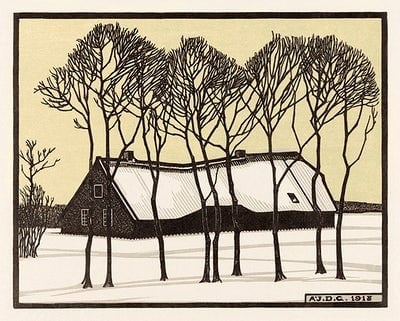
Farm in the Snow, Julie de Graag, 1918.
“What do you think about all of this corona-virus stuff?” the woman I worked for asked. I rolled my eyes and said “it’ll blow over” as I genuinely thought it would. I mean, why put her in a pit of despair when I could ease her anxiety? I’ve definitely learned to stop speaking in absolutes since then. I lost both of my nannying gigs, which had nothing to do with my work ethic but everything to do with me being potentially dangerous. I’ve never felt dangerous in my life before, but now It was possible for me to spread this disease, a disease I have no idea about.
I usually get a sense of when things are going to change in my life. This time I didn’t get a warning. I think because I wasn’t alone. It was every single person I knew. I remember saying to a friend, “Doesn’t this feel like the beginning of every zombie apocalypse movie you’ve ever seen?” not even realizing how trapped we would be in months to come. My partner and I decided to pack up for two weeks to stay with our families in upstate New York. Those two weeks turned into three months . . . back in our childhood homes, feeling completely stripped of our former adult lives. Suddenly we were teenagers again, being told when to be home for dinner.
With darkness there is always a silver lining. It’s difficult to keep hope in times like this, but we were some of the lucky ones. We were lucky that our parents are mostly enjoyable to be around and lucky to have some kind of income. Although we were blinded by the glaring light of chaos around us, if we squinted hard enough, we understood that we would eventually find solace in solitude.
Rae Weyn González is an illustrator based in New York City and the Hudson Valley who is pursuing an MFA at the School of Visual Arts. Rae's short story, "Grandpa's Possession," is also included in this issue.

